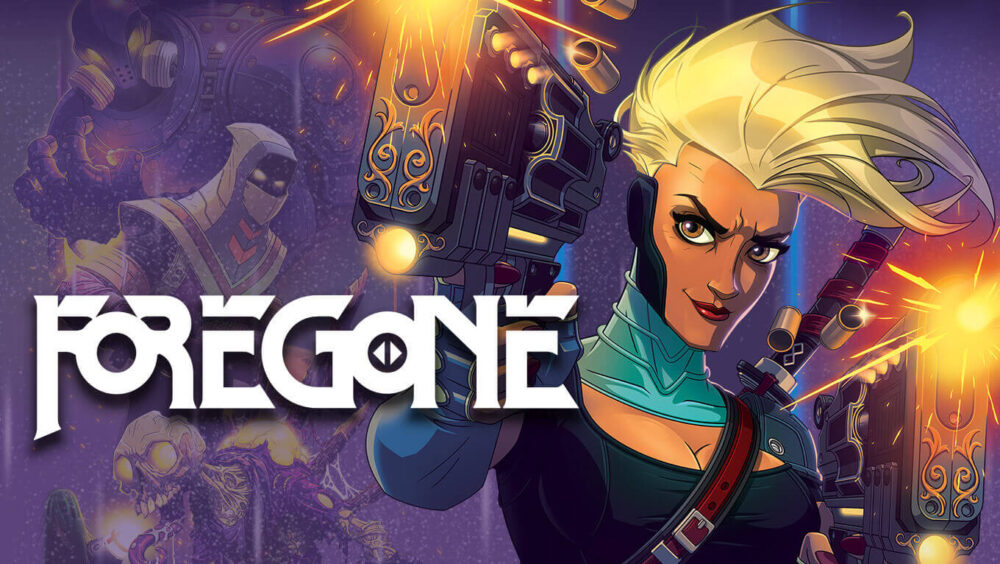Foregone, developed and published by Big Blue Bubble, is an enjoyable 2D action-platformer with easy-to-learn combat. Movement and combat both looks slick and makes you feel powerful – and reasonably masterful – while playing. Unfortunately, the level design never quite matches the complexity of the artwork, and the RPG-inspired gear system feels simultaneously simplistic, unbalanced, and overinvolved.
Set in yet another post-apocalyptic environment – dealing with the fallout of both a regional war and biological weapons program gone wrong – you take control of an elite soldier, the last of the Arbiters. She has dreams of an even more horrific future and devotes herself to hunting down the remnants of “Project Hera” that have run amok.

Despite both the premise and hybrid sci-fi/fantasy setting feeling overdone by this point, Foregone places a lot of focus on narrative, especially when compared to most games in the action-platformer genre. There are frequent monologues by the protagonist, villains prone to rambling outbursts, multiple flashbacks, and scattered notes to find. With not-so-subtle hints that there might be time travel involved, this narrative hook kept me pushing forward through the linear campaign.
If you can’t be bothered with video game narratives, there’s still plenty to enjoy on the gameplay front. Despite the action playing out on a 2D plane, the Arbiter swiftly unlocks a robust move-set: double jumps, ground slides, and air dashes all give you plenty of mobility when it comes to navigating the environments, closing in on enemies, and avoiding blows.

Foregone offers a lot of choices when it comes to weapon-based combat and powers. Daggers are fast but you need to get up close, swords have a good balance of speed and decent reach, spears do minimal damage but allow you to stay out of melee range. When it comes to firearms, burst rifles offer good accuracy and range, shotguns are useless at range but inflict massive damage and stun up close, pulse weapons can arc electricity between foes.
The Arbiter’s powers – which range from simple self-healing, to damaging dashes (great for moving through bosses), damage-absorbing shields, damage- and speed-boosting overcharge ability, and the screen-clearing Nova – all add to your combat repertoire. To keep things in check, ammunition for firearms and mana for spells is recharged through melee attacks, so you can’t avoid close-range combat entirely.

The movement and combat systems come together spectacularly during the tough but fair boss fights. These encounters are all about careful movement, positioning, observing shifting attack patterns, and finding a gap to inflict damage. Once you nail that rhythm, you can pile on the damage with minimal risk. Unfortunately, when it comes to mastering combat, not everything is about skill.
Foregone’s RPG-inspired gear system provides too much gear, too quickly during the campaign. On top of this, you have the short, replayable side missions – shorter and timed combat- or hazard-based levels that unlock as you progress through the story – that’ll drop even more gear. Different melee and ranged weapons offer unique attacks, and there are upgrade and crafting mechanics to keep them viable for longer, but a torrent of new gear makes those mechanics feel redundant and force you to spend far too much time sifting through your inventory.

I enjoy games with RPG systems that make your character more powerful over time, but it’s a double-edged sword in Foregone. When you combine a generous gear system with the branching character skill-trees and power upgrades, you can steamroll some encounters if you tackle all content as it unlocks. I feel Foregone would have been better balanced if weapons types were slowly unlocked like power, and the gear system instead focussed on continuously upgrading and rerolling abilities.
Another aspect of Foregone that slightly disappoints is the bland level structure. The stunning introduction – with sweeping views and elaborate backdrops – gives way to repetitive interiors that try to use every available space for the bulk of your playtime. It’s commonplace in the genre sure, but it lessens the impact of the otherwise excellent artwork and animations when you find yourself trudging through samey looking rooms, having to consult your map to get back to a locked door you’ve just pulled three identical switches to open.

Thankfully the Arbiter and her foes look and move with flair. Combat involves a stylish clash of blades, gunshots, elemental projectiles, particle effects, and gore that splatters the environment. Complementing the visuals and animations is great voice work from the Arbiter, decent enough battle sounds, and excellent music. There is a diverse range, from atmospheric, mood-setting ambience to high-tempo combat themes for boss encounters. One might dismiss the presentation of Foregone as generic at first glance, but it all comes together in action.
Overall, I enjoyed my time with Foregone despite its faults. Sure, I grew tired of navigating maze-like locations and constant juggling my inventory; but I never once grew tired of equipping “gunchucks” and a shotgun, dashing in close, stunning enemies with a blast of buckshot, before bludgeoning them in a swirl of chains and gunshots. Similarly, boss fights were always thrilling, challenging me to observe and master patterns without feeling unfair or unforgiving. Fans of action-platformers should not skip Foregone.
Publishe rand Developer: Big Blue Bubble
Platforms: Nintendo Switch, PlayStation 4, Microsoft Windows, Xbox One
This review is based on the PC version of the game which can be purchased here for £15.49
Enjoy the review? want to read more of our reviews? then click right here to be whisked away to the realm of our opinions.








You must be logged in to post a comment.